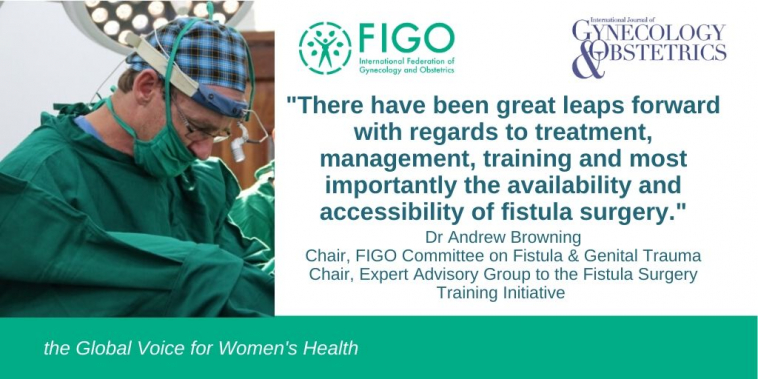Fistula: Where We Currently Stand
The latest IJGO supplement, co-authored by FIGO's Dr Andrew Browning and ISOFS, investigates where we currently stand on the prevention and treatment of obstetric fistula.

The latest IJGO supplement asks for honest answers to a complex question: just how far have we come in the prevention and treatment of obstetric fistula?
Back in 2007, FIGO’s academic journal led an inquiry to identify research needs and priorities for tackling prevention and treatment of this neglected public health and human rights issue.
The global community has since taken many positive steps - from then UN Secretary General Ban Ki-moon’s ambitious goal to end obstetric fistula by 2030, to the FIGO Fistula Surgery Training Initiative’s own series of education and treatment milestones.
Now the Special Issue Supplement, entitled Obstetric Fistula: Where we currently stand, jointly written by FIGO’s Fistula Surgery Training Initiative and the International Society of Obstetric Fistula Surgeons (ISOFS), draws on decades of clinical and programmatic expertise to put these milestones in context.
FIGO spoke to Dr Andrew Browning, co-author and Chair of both FIGO’s Committee on Fistula and Genital Trauma and the training initiative’s Expert Advisory Group.
Read Where We Currently Stand on Obstetric Fistula Treatment and Prevention.
“There have been great leaps forward with regards to treatment, management, training and most importantly, the availability and accessibility of fistula surgery achieved by the fistula community since the writing of the last supplement. More women are getting access to good surgical repair now, for which we are delighted.
Thanks to the 2015 push towards the 2030 Agenda for Sustainable Development there are also more places where women can give birth safely, so – hopefully – there are less new fistula cases developing in those contexts.
On the flipside, there have been frustrations. We are not where we would like to be; fistulae are still present, still being formed and worryingly, there is a rise in iatrogenic fistula. We still have a long way to go.
The trends we have identified in this new supplement need highlighting to the wider community, especially those involved in women's health. All the administrative policies in the world cannot help women living with fistula, if there are not enough health professionals, including trained, skilled fistula surgeons to actually deliver the specialised care to women with the condition on the ground.
Obstetricians, midwives and skilled health professionals are the ones who can prevent and treat obstetric fistula.
The FIGO Fistula Surgery Training Initiative plays an integral role in this. It is the only standardised and approved training program in fistula surgery, beginning as an effort to ensure that fistula training and surgical skills met an appropriate level. There were far too many people 'giving fistula surgery a go', which lead to all sorts of complications, failures and women in despair.
The FIGO Fellows are both lifting the standard of fistula surgery and increasing the availability of surgical care, which of course is leading to many more women getting treated and their lives changed.
It is a great and ambitious aim to have fistula eradicated by 2030, certainly a catalyst for positive change – but in reality I think we are going to need fistula treatment services well into the future. The backlog of women needing treatment will take years to clear. Then there is the unfortunate rise of fistula being caused, not by obstructed labour, but during operative deliveries and procedures such as hysterectomies.
Some countries are getting on top of maternal health challenges but others are not, especially those going through periods of conflict.
Still, it is tremendously exciting that the Fellows trained on the FIGO Fistula Surgery Training Initiative have completed more than 10,000 fistula repairs. That means thousands of lives changed, by surgeons and holistic care teams trained in the latest and most appropriate techniques. The women have been given the best possible help and chance of a cure, for which we are very thankful.”
Learn more about FIGO’s globally recognised, state-of-the-art training system for fistula surgeons and holistic care teams here.